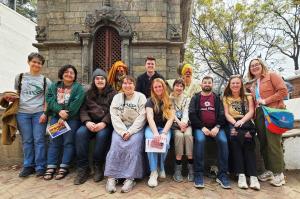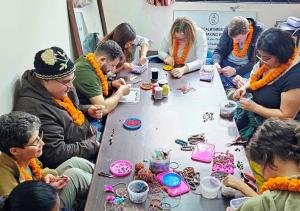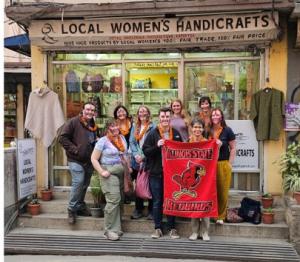Illinois State University and United Planet Partner for Transformative Fair Trade & Human Rights Program in Nepal
ISU and United Planet partnered for an immersive Nepal trip focused on fair trade, human rights, and cultural learning.
The 9-day trip, held from March 7–15, 2025, brought together seven students led by Dr. Noha Shawki, Professor at the Department of Politics and Government and Elizabeth Reed, the Director of the Office of Sustainability at Illinois State University for an educational journey designed to deepen participants’ understanding of global human rights issues and sustainable development through first-hand exposure to fair trade organizations, women-led cooperatives, and social enterprises across Nepal.
This marks another milestone in United Planet’s growing series of customized group programs that integrate service-learning, cultural exchange, and global citizenship.
“At United Planet, we believe that immersive, ethical travel experiences are essential for building global understanding,” said Mohammad Hijazi, Marketing and Communications Manager at United Planet who joined the trip.
“This program offered students a rare opportunity to engage with the communities behind global supply chains and to witness how fair trade initiatives directly empower artisans, preserve culture, and promote gender equity. We’re proud to support academic institutions like ISU that are committed to preparing socially conscious global citizens.”
The itinerary was designed to reflect the intersection of human rights, fair trade, and cultural heritage. The sites and experiences were not just selected for their cultural or ethical relevance, but were carefully curated in alignment with the learning objectives of the university course, ensuring a truly tailored and impactful educational experience. Upon arrival in Kathmandu, the group began their journey with guided tours of iconic religious sites such as Pashupatinath Temple and Boudhanath Stupa, offering insights into Nepal's spiritual roots and social values.
Over the following days, the group visited a range of impactful organizations, including:
• Karma Coffee, a women-led ethical café that champions circular economy practices;
• Sana Hastakala and Dhukuti Showroom, which support hundreds of artisans through ethical employment and skill development;
• Empowerment Collective, a fair trade initiative focused on sustainable fashion and holistic community development;
• LabelStep and Association for Craft Producers (ACP), leaders in ethical sourcing and artisan welfare.
Students engaged in meaningful dialogue with local leaders and observed the production processes of handmade textiles, pottery, and paper goods. They gained insights into how these fair trade enterprises offer dignified work, challenge systemic inequality, and elevate traditional craftsmanship on the global stage.
The group also explored the ancient city of Bhaktapur to witness live demonstrations of traditional pottery and papermaking. The experience not only highlighted the value of heritage preservation but also underscored the importance of sustainable tourism and conscious consumerism.
Toward the end of the trip, the group spent a weekend of rest and reflection at a resort in Namo Buddha, a tranquil village set in the Himalayan foothills. This quiet interlude allowed students to process the experience, share personal takeaways, and consider how their roles as global citizens can create positive change in both local and international contexts.
“This program provided our students with an invaluable opportunity to witness firsthand the global implications of the everyday choices we make,” said Shawki and Reed while reflecting on their journey. “Through the organizations we visited and the people we met on this trip, our students came to understand that fair trade is much more than just an economic model —it’s a powerful way to empower communities, promote sustainability, and uphold human rights. We are grateful for our partnership with United Planet in creating this experience for our students, helping them understand how everyday choices can have global impacts and drive meaningful change.”
In addition to fulfilling academic objectives, the program fostered transformative personal growth. Students returned to the U.S. not only with course credit but also with new perspectives on social responsibility, ethical consumption, and the power of grassroots community development. Several participants expressed a renewed interest in careers related to global development, international nonprofits, and human rights advocacy.
The program reflects United Planet’s broader mission to create a global network of leaders who collaborate across borders to solve the world’s most pressing challenges. With customized group volunteer programs in more than 40 countries, United Planet continues to support educational institutions in designing impactful, ethical, and culturally immersive travel experiences for students and faculty.
To learn more about United Planet’s customized faculty-led programs or to start planning a similar experience for your institution, visit https://www.unitedplanet.org/faculty-led-programs.
Mohammad Hijazi
United Planet
+1 617-874-8041
marketing@unitedplanet.org
Visit us on social media:
Facebook
X
LinkedIn
Instagram
YouTube
TikTok
Legal Disclaimer:
EIN Presswire provides this news content "as is" without warranty of any kind. We do not accept any responsibility or liability for the accuracy, content, images, videos, licenses, completeness, legality, or reliability of the information contained in this article. If you have any complaints or copyright issues related to this article, kindly contact the author above.
CTRL+ALT Digital Successfully Redesigns 22 Board Websites for Florida Department of Health
Despite Travel Advisories, These Are the Safest Cities for LGBTQ Travelers During 2025, According to misterb&b
Native American & Italian American Groups Unite to Protect Cultural Heritage at Solidarity Session
Więcej ważnych informacji
 Jedynka Newserii
Jedynka Newserii

 Jedynka Newserii
Jedynka Newserii

Konsument

Polacy nie korzystają z hossy trwającej na warszawskiej giełdzie. Na wzrostach zarabiają głównie inwestorzy zagraniczni
Od października 2022 roku na rynkach akcji trwa hossa, nie omija ona także warszawskiej giełdy. Mimo to inwestorzy indywidualni odpowiadają zaledwie za kilkanaście procent inwestycji, a o wzrostach decyduje i na nich zarabia głównie kapitał z zagranicy. Widać to również po napływach i odpływach do i z funduszy inwestycyjnych. Zdaniem Tomasza Koraba, prezesa EQUES Investment TFI, do przekonania Polaków do inwestowania na rodzimej giełdzie potrzeba zysków z akcji, informacji o tych zyskach docierającej do konsumentów oraz czasu.
Polityka
Obowiązek zapełniania magazynów gazu w UE przed sezonem zimowym ma zapewnić bezpieczeństwo dostaw. Wpłynie też na stabilizację cen

Unia Europejska przedłuży przepisy z 2022 roku dotyczące magazynowania gazu. Będą one obowiązywać do końca 2027 roku. Zobowiązują one państwa członkowskie do osiągnięcia określonego poziomu zapełnienia magazynów gazu przed sezonem zimowym. Magazyny gazu pokrywają 30 proc. zapotrzebowania Unii Europejskiej na niego w miesiącach zimowych. Nowe unijne przepisy mają zapewnić stabilne i przystępne cenowo dostawy.
Infrastruktura
Gminy zwlekają z uchwaleniem planów ogólnych zagospodarowania przestrzennego. Może to spowodować przesunięcie terminu ich wejścia w życie

Reforma systemu planowania i zagospodarowania przestrzennego rozpoczęła się we wrześniu 2023 roku wraz z wejściem w życie większości przepisów nowelizacji ustawy z 27 marca 2003 roku. Uwzględniono w niej plany ogólne gminy (POG) – nowe dokumenty planistyczne, za których przygotowanie mają odpowiadać samorządy. Rada Ministrów w kwietniu br. uchwaliła jednak ustawę o zmianie ustawy z 7 lipca 2023 roku, a jej celem jest zmiana terminu obowiązywania studiów uwarunkowań i kierunków zagospodarowania przestrzennego gmin na 30 czerwca 2026 roku. Wskazana data może nie być ostateczna z uwagi na to, że żadna z gmin nie uchwaliła jeszcze POG.
Partner serwisu
Szkolenia

Akademia Newserii
Akademia Newserii to projekt, w ramach którego najlepsi polscy dziennikarze biznesowi, giełdowi oraz lifestylowi, a także szkoleniowcy z wieloletnim doświadczeniem dzielą się swoją wiedzą nt. pracy z mediami.











.gif)

 |
| |
| |
|